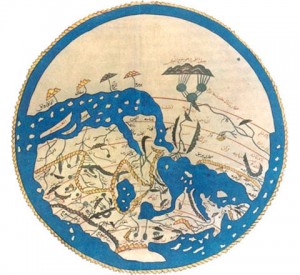 Light Colour Line – Perceiving the Mediterranean: Conflicting Narratives and Ritual Dynamics (Bern, 9-11 Sep 2013)
Light Colour Line – Perceiving the Mediterranean: Conflicting Narratives and Ritual Dynamics (Bern, 9-11 Sep 2013)
Bern, September 9 – 11, 2013
Deadline: Mar 1, 2013
5th International Conference of Mediterranean Worlds hosted by the Department of the History of Art, TransMediterraneanStudies, University of Bern. In collaboration with The Mediterranean Seminar, University of California Santa Cruz; Department of History, 29 Mayis University; Eastern Mediterranean University, Famagusta and University of Colorado at Boulder.
The theme of this interdisciplinary conference will focus on three issues:
1. The light, the colour, the horizon line are parameters for the perception of the Mediterranean. A statement such as “the colour of the Mediterranean is only turquoise in the indirect light of Capri’s Blue Grotto” is an example of the utopian metaphors that have shaped the image of this region. From classical times to today, the subjective image of the Mediterranean has moved so close to its object that it is perceived to have substantially converged with it. The subjective image has altered the history of its object, its linguistic, sectarian and social structures, giving rise to incomprehension or even rejection between ‘Occident’ and ‘Orient’. At the same time, however, it has also set a process of cultural osmosis in motion. Is there a valid image, a correlative or interactive visualization of the Mediterranean and its inhabitants?
2. Using narrative forms of representation, literary, filmic and photographic media require modes of perceiving the Mediterranean that in comparison with perceived reality reveal – on both sides – fractures and contradictions, conflicting narratives. Pictorial and textual narratives are attempts to perceive a region, a space, or a utopia which have their origin in and reflect the oral tradition of their inhabitants in the ports, trading posts and caravanserais. For this purpose the oral tradition has used predominant narratives and
counter-narratives, heroes and anti-heroes, realities and utopias. How has this dialectic form of oral tradition been represented in pictorial and textual media from ancient times to the present day?
3. The title colour line is deliberately ambivalent, touching in equal measure on both the history of perception, epistemology, social anthropology and the political history of the Mediterranean. Thus, the Mediterranean is not only Europe’s most lethal border, located between three continents, three religions and ethnicities, but also the ‘transmission belt’ of an osmotic network that defines the dynamic development of the whole region. An important factor for this osmosis is the exchange, interdependence and transformation of ritual practices
– linguistic, religious and political ceremonials. Accordingly, the aim of the symposium is to show that ritual dynamics have functions that integrate as well as exclude. Could ritual dynamics in fact constitute the mainspring for a mental affinity between the various Mediterranean cultures, for a mutual sense of cultural curiosity that traditional Mediterraneanism has sought to elucidate through the concepts of the cultural unity (Braudel) or connectivity (Horden-Purcell) of the Mediterranean?
SUBJECT AREAS:
Papers are required to be thought-provoking and methodically inventive, preferably addressing the following subjects:
– Light and Colour in Mediterranean Arts and Architecture.
– Perspectivism, Optics and Islam.
– Cinematographic Views: Perception and Reconstruction of the Mediterranean.
– Predominant and Counter-Narratives in Literature and Mythology.
– Oral Tradition and Artistic Performance: Means of Communication.
– Conflicting Narratives: Respect and War.
– The Osmosis of Honour and Shame.
– Inconsistence and Resistance.
– Performance of Mediterranean Rituals.
– Ritual Perception of History in the Mediterranean.
– The Mediterranean Sea as Colour Line.
– Migration: Sought Horizons and Lines of Sight.
ABSTRACT SUBMISSIONS:
Participants are invited to submit 300-word abstracts for 25-minute presentations. Abstracts should include at least three descriptive keywords, the presenter’s name, organization, email and mailing address. The language of the conference will be English. Please send your abstracts to: agnes.sebestyen@ikg.unibe.ch
CONFERENCE ORGANIZER:
Prof. Dr. Thomas Dittelbach
Department of the History of Art – TransMediterraneanStudies
University of Bern
www.ikg.unibe.ch
FURTHER INFORMATION:
www.medworlds5.com
CONTACT:
Ágnes Sebestyén
Organizing Assistant
Department of the History of Art – TransMediterraneanStudies
University of Bern
E-Mail: agnes.sebestyen@ikg.unibe.ch

Leave a Reply
You must be logged in to post a comment.